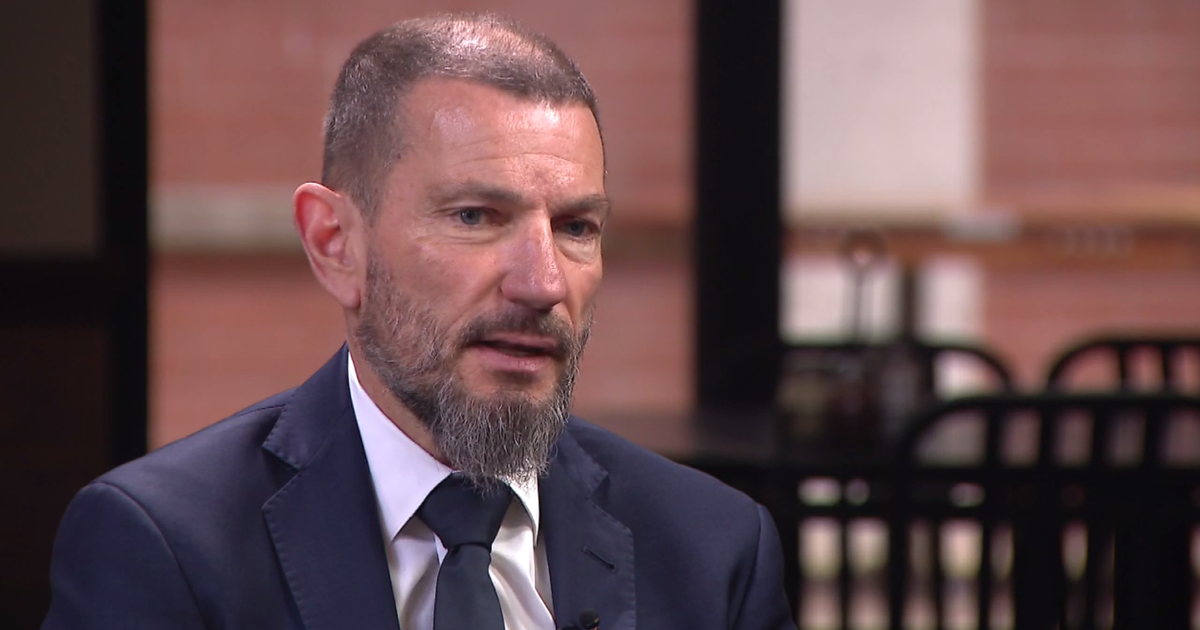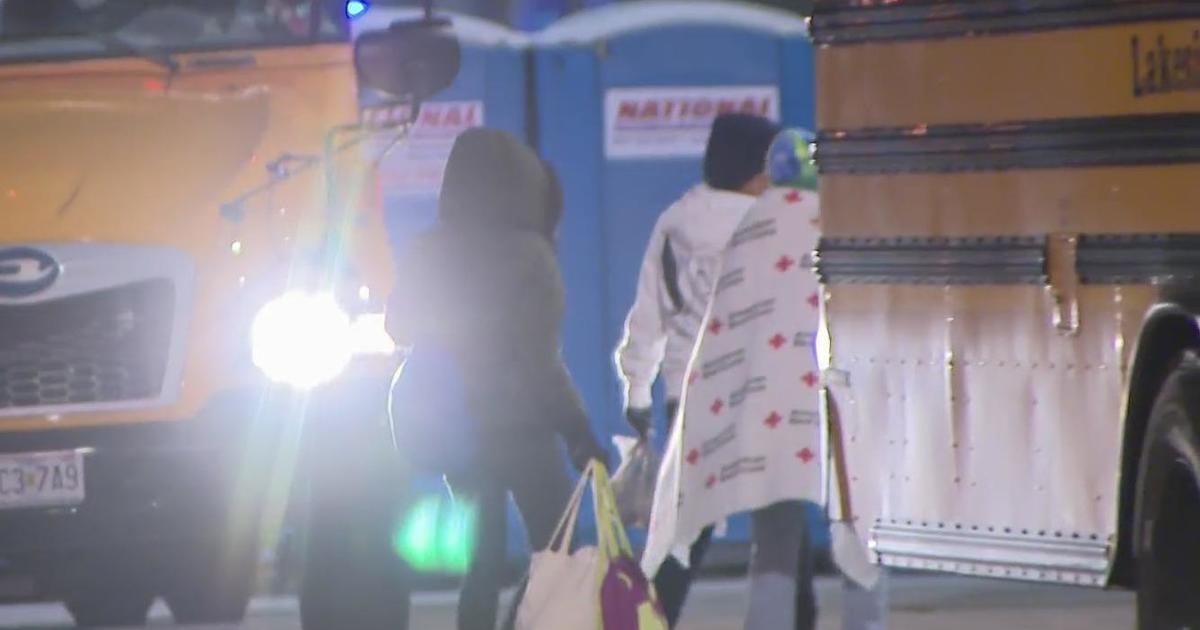Progressive Caucus demands end to Chicago migrant evictions
CHICAGO (CBS) -- Mayor Brandon Johnson's closest allies on the City Council are urging him to end Chicago's 60-day migrant shelter limit policy, a day after the city began evictions, and to demand more state and federal help to care for asylum seekers.
The council's 19-member Progressive Reform Caucus has frequently voiced opposition to evicting migrants from city-run shelters, and on Monday issued a statement urging the mayor to immediately end the policy.
The Johnson administration has said the 60-day shelter limit is part of a strategy to more quickly get asylum seekers in Chicago out of city-run shelters and into more permanent housing.
"The Progressive Caucus disagrees strongly with the strategy, as it risks contributing to the city's unhoused population and exacerbating social and racial tension at a time when we need to unite," the caucus said in a statement.
The caucus' members include Alds. Daniel La Spata (1st), Lamont Robinson (4th), Desmond Yancy (5th), William Hall (6th), Julia Ramirez (12th), Jeylu Gutierrez (14th), Jeanette Taylor (20th), Ronnie Mosley (21st), Michael Rodriguez (22nd), Byron Sigcho-Lopez (25th), Jessie Fuentes (26th), Ruth Cruz (30th), Rossana Rodriguez Sanchez (33rd), Carlos Ramirez-Rosa (35th), Andre Vasquez (40th), Angela Clay (46th), Matt Martin (47th), Leni Manaa-Hoppenworth (48th), and Maria Hadden (49th).
Progressive alderpersons seek work permits, more rental assistance for migrants
The caucus said Johnson should immediately end the 60-day shelter limit, and call on more help from the state and federal governments. Specifically, they want Gov. JB Pritzker and state lawmakers to provide funding for up to six months of rental assistance for newly arrived migrants, and for President Joe Biden to issue an executive order issuing work permits for all new arrivals.
"As progressives, we believe it is critical for all levels of government to recognize and combat the root causes that contribute to so many of society's ills. Rather than addressing root causes, however, we fear that the City's 60-day shelter eviction policy is worsening them," the caucus wrote. "To address this crisis collaboratively and compassionately, we must do it together."
In November, the state cut back on rental assistance for migrants, reducing it from six months to three months, and limiting assistance to migrants who arrived in city shelters before Nov. 17, 2023. Migrants who have arrived since then are not eligible for rental assistance from the state.
Progressive alderpersons noted many of the newly arrived migrants facing potential eviction soon have not yet received work permits from the federal government, and are not eligible for rental assistance, making it difficult for them to be able to arrange for permanent housing.
Asked for a response to the Progressive Caucus, mayoral spokesman Ronnie Reese referred CBS 2 to a statement from last week, before evictions began, in which Johnson said, "Our city is committed to compassion."
"By encouraging resettlement while also providing case-specific extensions with a focus on health and safety, we are advancing a pathway to stability and self-sufficiency," Johnson said. "While we know Chicago's limited resources cannot meet the full scale of need across the New Arrivals Mission ... we are constantly evaluating options that will lead to better care for all Chicagoans."
City delays some evictions under migrant shelter limit
Evictions had been scheduled for nearly three dozen migrants on Sunday at three city-run shelters, but most of those were granted extensions to stay at their current shelters, and only three migrants were forced to leave. Those migrants have the option of returning to the city's migrant landing zone to reapply for a spot in a shelter.
The 60-day shelter limit was first announced in November, and delayed multiple times during the winter due to the weather, before the city began evicting the first group of migrants from shelters on Sunday.
On Friday, the mayor's office also announced it was relaxing its eviction policy, granting migrant families with children up to three 30-day extensions through June 10, allowing them to stay in the same shelter through the end of the school year. Before that change to the policy, more than 3,800 people were facing potential eviction from migrant shelters beginning on Saturday.
Under the new policy, more than 2,000 migrants now are set to be evicted by April 30. The next round of evictions is set for later this month and is expected to affect more than 200 migrants.
The Johnson administration has said, when migrants in shelters are given a 60-day notice of their deadline to leave, they are provided with case management to help them apply for rental assistance and locate available housing. Migrants who are in the process of moving into a permanent home when their 60 days are up can be given extensions to stay until they're ready to move into a new home.
There are currently nearly 11,000 migrants staying at 23 city-run shelters in Chicago, most of them sent to the city on buses by Texas Gov. Greg Abbott without coordinating with city or state officials here, and often without proper clothing or supplies for the Chicago weather.
Alders fear increased costs for homelessness services
The Progressive Caucus called Abbott's treatment of migrants "reprehensible and inhumane," and added "inaction by the Federal government has left City, County, and State leaders with no ideal solutions."
"But evicting new arrivals from the only place they have to live won't address these challenges; rather, it will exacerbate them. New arrivals may be offered the opportunity to go to the landing zone, but many will likely end up living on the streets and parks near the shelter they were displaced from," the caucus wrote.
That would lead to an increase in the cost of providing homelessness services, and lead to more exploitation of migrants who are still seeking jobs and permanent homes, according to the caucus.
"If we work together, we will not only make it through this crisis, but we will do so in a way that advances our mission to create a more equal and just Chicago – not only for new arrivals, but for all Chicagoans," the caucus wrote.
These evictions come on the heels of a measles outbreak among migrants. As of Friday, the city confirmed 12 measles cases, 10 of which are from the migrant shelter in Pilsen. Two are students.
The city is taking additional precautions by making people get vaccinated upon arrival. As of Friday, nearly 900 received the MMR vaccine at the Pilsen shelter.



